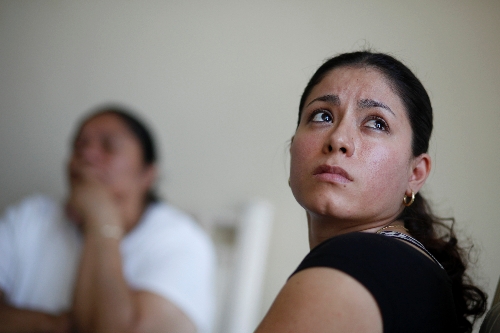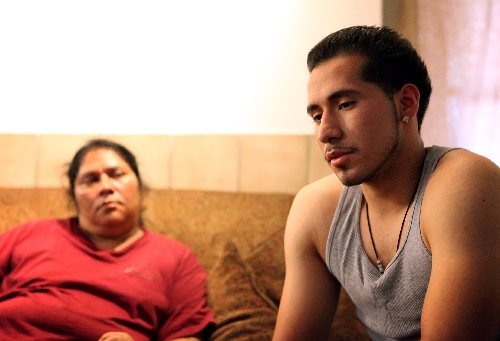Deaths raise questions about Nevada troopers’ use of Taser
Attorney Matthew Callister is unsure of many things in the case of the man who fell from a highway overpass this month after being shocked with a Taser by a state trooper.
But Callister, who represents the family of Alejandro Sanchez-Escoto, is convinced of one thing: The 29-year-old father did not jump from the Las Vegas Beltway bridge, a possibility raised by the Nevada Highway Patrol.
"He was not suicidal. He was not depressed," Callister said Wednesday. "He had everything to live for."
Sanchez-Escoto's purpose for living was his son, Alex, whose 10th birthday is Tuesday, relatives said.
Sanchez-Escoto, who had taken a job as a cook, was making plans for his son's celebration. Family members were emphatic that Sanchez-Escoto did not kill himself.
"I want the truth," said Raul Morales-Escoto, Sanchez-Escoto's brother. "I want to clear his name."
In his search for answers, Callister is looking for witnesses who saw what led up to Sanchez-Escoto's death at the Beltway and Decatur Boulevard on Sept. 7.
He is considering a lawsuit against the Highway Patrol, but has held off because there are too many unanswered questions.
The Clark County coroner's office has yet to release Sanchez-Escoto's cause and manner of death.
The Metropolitan Police Department is investigating the Highway Patrol's role in the incident, but has not shared its findings with Callister. It's protocol for the Police Department to investigate any Highway Patrol in-custody death or officer-involved shooting. Las Vegas police did not return a call for comment last week.
Sanchez-Escoto's family said he was in the country illegally. He might have been running from a trooper because he was afraid of being deported.
Chris Perry, director of Nevada's Department of Public Safety, which oversees the Highway Patrol, said he could not comment extensively because the case is still under investigation.
Perry said the Highway Patrol is also conducting an internal investigation to determine whether the trooper involved, who hasn't been identified, violated any policies.
The Highway Patrol said Sanchez-Escoto was running in Beltway travel lanes. When a trooper approached, he fled.
The trooper pursued and fired his Taser because of the risk the man posed to himself and the public.
But the Taser did not make proper contact and did not subdue Sanchez-Escoto, who eventually went over a barrier wall and fell to his death.
The confrontation occurred about 4:30 a.m.
About 2½ hours earlier, Sanchez-Escoto, his mother and sister had planned to walk to a grocery store near their apartment, near Tropicana Avenue and Jones Boulevard.
Sanchez-Escoto drank two or three 24-ounce beers before his death, his family said. He was last seen on Hacienda Avenue, just south of Tropicana Avenue, about 2:30 a.m. On the way to the supermarket, he left his mother and sister.
Callister does not know why Sanchez-Escoto was on the highway. But he said it's not plausible the man jumped to his death, because the Beltway overpass is only about 18 feet over Decatur. If he had been suicidal, he would have picked a taller bridge, Callister contends.
Sanchez-Escoto had no history of mental illness, as far as Callister knows.
Callister said it's clear to him that the Highway Patrol caused Sanchez-Escoto's death. He acknowledged, however, that Sanchez-Escoto might have accidentally slipped and fallen to his death. The barrier on the overpass where Sanchez-Escoto fell was only thigh-high, he said.
If Sanchez-Escoto's case leads to a lawsuit, it would be Callister's second against the Highway Patrol for an in-custody Taser death.
LAWSUIT FILED IN ANOTHER DEATH
He also represents the family of Eduardo Lopez-Hernandez. The 21-year-old man died Aug. 25, 2010, after he was shocked by Taser 19 times by state troopers.
Before his death, Lopez-Hernandez was involved in a car crash and then a fight with other motorists.
That afternoon, traffic on northbound U.S. Highway 95 had been snarled for hours because of a chemical spill near downtown.
Lopez-Hernandez got in a fender bender, which led to a fight with three men who beat him, chased after him when he drove away, then beat him some more when he crashed while trying to get away.
The Highway Patrol received a call about 6:50 p.m. reporting a fight with five guys beating another man with a broomstick and throwing him over a wall, according to dispatch records.
The lawsuit said Lopez-Hernandez saw the responding troopers and headed toward them for help. A confrontation followed, and Lopez-Hernandez was unconscious within minutes. He was rushed to the hospital, where he died from cardiac arrest.
Lopez-Hernandez was shocked with a Taser several times, including in the neck, after troopers handcuffed him.
In April, Clark County District Attorney Steve Wolfson declined to press criminal charges against the troopers involved .
Callister refused to comment on Wolfson's decision.
Perry, with the Department of Public Safety, declined extensive comment about the Lopez-Hernandez case because of the ongoing lawsuit .
He did say that an internal investigation into the incident has been completed, but the findings also can't be released because of the lawsuit.
Callister said he is troubled that the Highway Patrol is again involved in a death in which Tasers were used.
He said the two cases have many similarities, specifically that both Sanchez-Escoto and Lopez-Hernandez appeared to be in highly emotional states before their encounters with troopers. Troopers should have taken that into account, he said.
Callister said the Highway Patrol had not adequately trained troopers in Taser use at the time of the Lopez-Hernandez incident. Police consider Tasers nonlethal weapons. He said it was clear troopers used excessive force in the Lopez-Hernandez case.
"They Tased the gentleman ... while he was already handcuffed, facedown," Callister said.
According to a Nevada Department of Public Safety policy provided by Callister, Taser use should generally be avoided with "individuals who are handcuffed or otherwise restrained." The policy says there are exceptions when other reasonable options appear ineffective, and that "reasonable efforts" should be taken to avoid using the weapon on the head, neck, chest and groin.
The policy also states that Tasers should not be used in instances that might result in "collateral injury," such as a fall from a height, as was the case with Sanchez-Escoto.
Perry, who did not have the Taser policies in front of him when interviewed last week, said the policies obtained from Callister seemed authentic. Those policies were adopted this year.
Callister hopes to bring Lopez-Hernandez's case to trial in the spring.
RACIAL PROFILING DENIED
Angelica Huerta, 34, was Sanchez-Escoto's ex-girlfriend. Alex Sanchez is her son.
Huerta said in Spanish that Sanchez-Escoto had a great relationship with their child, and she and Sanchez-Escoto remained close, even though they split up years ago.
Huerta said Sanchez-Escoto saw his son several times a week and spoke with him on the phone daily. She said he provided for him financially.
She said since his father's death, Alex, who used to be a sociable child, has been more reserved and quiet.
When Alex was asked if he missed his father, he just shook his head yes.
Callister said Lopez-Hernandez's girlfriend was expecting a child before his death.
While Callister questioned whether Hispanics are being unfairly targeted by law enforcement in Southern Nevada, Perry denied the implication of racial profiling. He said troopers had responded to calls for help in the Sanchez-Escoto and Lopez-Hernandez cases.
"I don't know what kind of correlation Mr. Callister is trying to draw," Perry said.
Callister acknowledged that a language barrier might have played a role in the deaths of Sanchez-Escoto and Lopez-Hernandez.
But still, he is disturbed by the circumstances of the two cases.
"There are too many Hispanic young men who seem to be the target of inappropriate utilization of Tasers."
Contact reporter Antonio Planas at aplanas@reviewjournal.com or 702-383-4638.
Attorney seeks help
If you have any information about the death of Alejandro Sanchez-Escoto, who fell to his death Sept. 7 after an altercation with Nevada Highway Patrol at the Las Vegas Beltway and Decatur Boulevard, please call the Law Office of Callister & Associates at 702-385-3343.



















